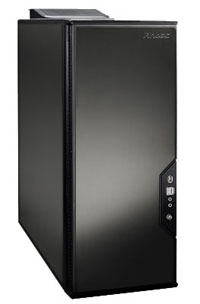What's the magic price point for SSDs?

Ever since Anand Lal Shimpi described using SSD drives as the single most noticeable upgrade you can do to your computer, I've been looking for the right price point to follow his example and make the SSD move.

(Credit: Antec)
It's not that I'm dissatisfied with the performance of my main desktop computer at home. After all, I've just upgraded the CPU from a 2.0GHz (overclocked to 2.66GHz) E4400 Intel Core 2 Duo to a 3GHz Q9650 quad-core. The machine already had 4GB of RAM, an Nvidia Geforce 8800GTS 320MB, several terabytes of hard disk space, and a Thermalright Ultra 120 heatsink.
All of this only just fits in an Antec P182 case, which keeps the whole deal fairly silent. And, of course, there's the obligatory 22-inch monitor, which may shortly be joined by a 17-inch auxiliary.
But like any PC enthusiast, I'm always looking for the next thing to upgrade, and Anand's comments piqued my interest. AnandTech's analysis has shown that SSD drives are at least comparable on most benchmarks to traditional hard disks, except the read latency, where they are ahead by an order of magnitude.
It's this factor that can put SSDs out in front when it comes to the speed of loading large applications like computer games, operating systems (even virtualised ones) and video and photo editing tools, all of which I use on a regular basis.
But a casual search of an Australian online PC parts retailer (my favourite is Aus PC-Market) reveals the price is still too high compared with a traditional magnetic hard disk; at least in my opinion. For example, if you want the cream of the SSD crop, a 160GB Intel X25-M, you're gonna be forking out in excess of $1100. That's a lot of peanuts to increase the speed of loading your apps.
In comparison, you can get a 150GB Western Digital Velociraptor (considered the king of speedy hard disks) for over $250. Hell, you could buy two, speed them up by placing them in a RAID array, and you'd still come out ahead by more than half compared to Intel's SSD option.
Of course, you can go down the pile a bit ... Aus PC-Market's list bottoms out at the 32GB PQI disk at $156.20, which isn't going to get you anywhere near the performance of the Intel, but is obviously much more affordable.
But, my colleague, reviews editor Craig Simms, has demonstrated to me in the ZDNet.com.au bunker that there are risks of buying a low-quality SSD drive — jittering when carrying out basic operating system tasks being one of the more annoying problems. I should note we haven't directly tested the PQI mentioned above.
If Intel brought down its prices by half, I'd have to say I would seriously look at buying one of its top of the line SSDs, but that's unlikely to happen. In the meantime, I'm left wondering at what price level I should take the plunge. Or should I try another brand? Which one?